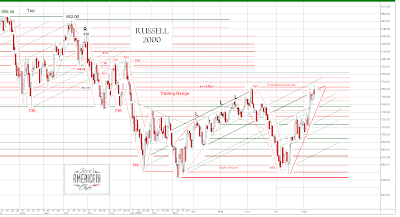The real wild card here is continued 'co-operation' amongst the world's central banks, geopolitical events, and of course the length and depth of the recession.
Morgan Stanley sees more finance crisis pain
Sun Aug 17, 2008 9:23am EDT
FRANKFURT (Reuters) - The financial crisis will probably not end until next year or even 2010, Germany's Handelsblatt newspaper quoted Morgan Stanley co-President Walid Chammah as saying in a preview of its Monday edition.
Chammah also expected more banks to fall victim to the crisis, the paper said.
"We will likely see more insolvencies among small U.S. regional banks that have focused on mortgage business," the paper quoted him as saying.
Chammah also said return-on-equity rates of 25 percent were a thing of the past for the investment banking industry, the paper reported.
"I estimate returns in the industry will be more like 15 to 20 percent as a rule," the paper quoted him as saying.






































